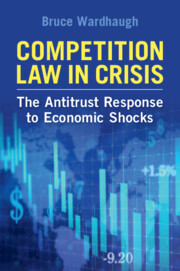Book contents
- Competition Law in Crisis
- Competition Law in Crisis
- Copyright page
- Dedication
- Contents
- Preface
- Acknowledgements
- Table of Authorities
- Introduction
- 1 The Legal Framework
- 2 The Pre–More Economic Approach to Competition’s Role in Crisis Management
- 3 The Post-MEA Relationship between Competition Law and Crisis Management
- 4 The Financial Crisis of 2008
- 5 The Covid-19 Crisis
- 6 Brexit
- 7 The Environment, Sustainability Goals and the Climate Crisis
- Conclusion
- Bibliography
- Index
6 - Brexit
Squandered Opportunities?
Published online by Cambridge University Press: 04 August 2022
- Competition Law in Crisis
- Competition Law in Crisis
- Copyright page
- Dedication
- Contents
- Preface
- Acknowledgements
- Table of Authorities
- Introduction
- 1 The Legal Framework
- 2 The Pre–More Economic Approach to Competition’s Role in Crisis Management
- 3 The Post-MEA Relationship between Competition Law and Crisis Management
- 4 The Financial Crisis of 2008
- 5 The Covid-19 Crisis
- 6 Brexit
- 7 The Environment, Sustainability Goals and the Climate Crisis
- Conclusion
- Bibliography
- Index
Summary
State aid took on significance during and in the immediate aftermath of the Brexit referendum’s campaign. This chapter argues that this was a result of campaigners’ misunderstandings regarding the nature of the EU’s state aid regime. The second section considers the two agreements that define the future UK–EU relationship: the withdrawal agreement and a EU–UK Trade and Cooperation Agreement governing the parties’ post-Brexit relationship. It discusses the implications of these agreements for the post-Brexit competition regime. The third section suggests what the UK’s competition provisions might look like post-Brexit. The analysis shows that there is little that has or can be gained through this new regime. The fourth section considers the subsidy provisions which are contained in the agreements between the EU and UK. These provisions give the government greater scope to subsidise firms, industries and regions in the name of industrial policy and regional equity. The chapter is sceptical about the utility of the anticipated post-Brexit industrial policy and competition regime. It appears that the new regime will incorporate many elements against which we have cautioned against in this work.
- Type
- Chapter
- Information
- Competition Law in CrisisThe Antitrust Response to Economic Shocks, pp. 163 - 194Publisher: Cambridge University PressPrint publication year: 2022

